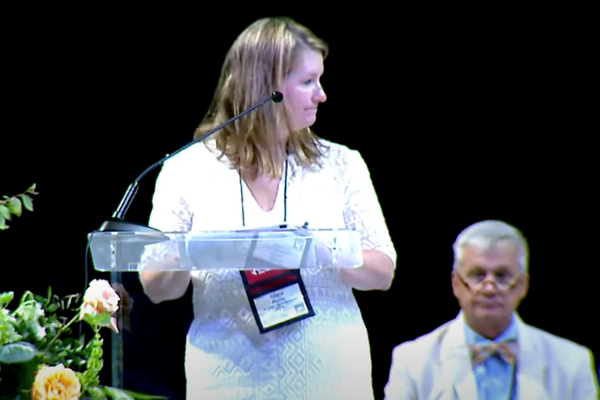MOBILE — In the final business session of the United Methodist Church's Alabama-West Florida Conference's (AWFC) annual conference on Wednesday, an AWFC trustee addressed a new policy that makes it harder for churches to disaffiliate from the denomination, sparking questions from the delegates in attendance.
The UMC is currently undergoing a major division as traditional churches are pursuing disaffiliation in light of a growing faction of progressive Methodists pressuring the church to change its Book of Discipline, which sets forth the law and doctrine for UMC churches.
Since December, over 500 Methodist churches have left the UMC in Alabama alone.
AWFC trustees released the updated disaffiliation eligibility policy last week. The policy adds additional requirements on churches seeking disaffiliation through paragraph 2553, a rule in the UMC's Book of Discipline that establishes criteria for churches in the UMC to disaffiliate while retaining church property.
Churches have until the end of the year to complete the disaffiliation process before the rule expires.
Traditional methodists fought to establish rule 2553 in 2019 to assist churches that refused to abide by the UMC's official traditional stance on marriage and homosexuality to leave the denomination. However, traditional churches began to take advantage of the rule last year, fearing the growing progressive faction might try to change the Book of Discipline during next year's General Conference.
One of the requirements in the AWFC policy requires that churches seeking disaffiliation provide the trustees a "statement of eligibility" explaining why they want to disaffiliate. It limits a church's reason for disaffiliation to reasons of conscience "related to the practice of homosexuality or the ordination or marriage of self-avowed practicing homosexuals' pursuant to [paragraph] 2553.1."
The AWFC Trustees will review this statement to determine whether a church is eligible for disaffiliation under rule 2553 in the first place.
Conservative Methodist leaders called it a "nail in the coffin" for traditional churches in the conference who are seeking to leave the denomination in good faith.
The policy also requires churches seeking to disaffiliate to take 40 days of prayer and fasting. The trustees changed the policy on Tuesday, banning certain topics from official church meetings. This includes arguments to leave the UMC based on a "financial opportunity" or information about alternatives to remaining in the UMC.
"This decision to disaffiliate is not a choice between alternatives, but it is a limited right," said AWFC Board of Trustees President Olivia Poole. "Pastors and staff in a church in the process of disaffiliation should use their best efforts to maintain the integrity of the disaffiliation process as outlined in paragraph 2553."
When asked by a delegate, Poole refused to specify whether, if the new policy had been instituted earlier, some churches who had already disaffiliated would not have been allowed to disaffiliate. However, she said churches that have already started the disaffiliation process but have not yet completed it would not have to start over. Instead, they would just have to meet the new requirements.
According to Poole, the rule was a direct result of a decision made by the Judicial Council, which the council released in April. The trustees announced the policy nearly three months later, on June 5. It went into effect that day.
One delegate asked why, if the trustees started working on the policy in April, the trustees did not announce it until a week before the annual conference.
"As you know, we gathered together to perfect a document … and the conference Board of Trustees did not meet until the first week of June," Poole answered.
According to Bishop David Graves, the policy could not be voted on because it was under the authority of the Board of Trustees to institute. Consequently, Graves did not allow any delegates to make any arguments for or against the policy.
Another delegate asked Graves how he could reconcile the new policy with a statement he made in 2019 in which he promised to assist churches seeking to disaffiliate to get where they want to be.
"I am bound to follow the Book of Discipline," Graves answered. "In 2019, we went through a policy … I can only deal with the cards that are handed to me."
Following the discussion, the delegation voted in favor of a motion for the Board of Trustees to craft a reaffiliation process for churches that have left the UMC that may regret doing so in the future.
On Tuesday, the conference voted to approve a rule clarification by the Board of Trustees which would prevent over 200 disaffiliating clergies from receiving retirement benefits. There were questions about whether the possibility of losing retirement benefits was made clear to disaffiliated clergy before they left the denomination.
To connect with the author of this story or to comment, email will.blakely@1819news.com or find him on Twitter and Facebook.
Don't miss out! Subscribe to our newsletter and get our top stories every weekday morning.










